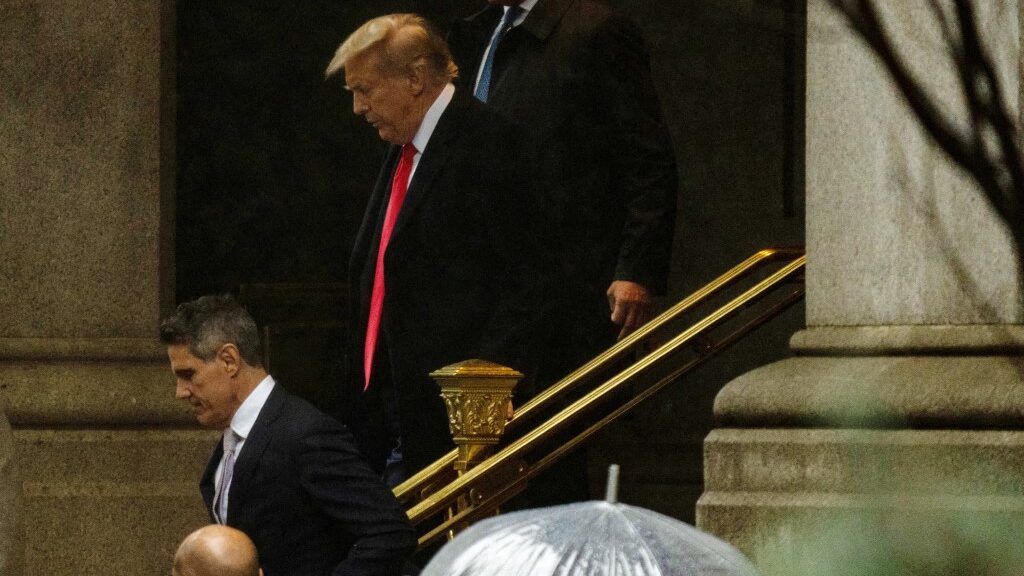
ormer U.S. President Donald Trump departs the Waldorf Astoria where he held a press conference following his appearance in court on January 9, 2024 in Washington, DC.
Photo: Kent Nishimura / GETTY IMAGES NORTH AMERICA / Getty Images via AFP
The U.S. Supreme Court will hear oral arguments on February 8th on Donald Trump’s appeal on the state of Colorado attempting to keep the former president off the 2024 primary ballot. Two states, Colorado and Maine, have attempted to bar Trump from appearing on the Republican primary ballot because of his alleged role in the January 6, 2021 events. The Colorado decision was made by judges appointed by Democrats; the Maine decision by the unelected secretary of state, also a Democrat. In both cases, the decisions were based on a constitutional provision that prohibits anyone who has “engaged in insurrection or rebellion” to hold public office.
Trump has not been convicted of any crime related to the “insurrection”—or any crime at all— upon which the rulings are based. The Supreme Court, whose 6-3 conservative majority includes three Trump appointees, is not asked to make a political decision, but simply to determine whether the lower authorities have the constitutional mandate to apply the above provision to someone not convicted of the crimes in question.
Trump is the first former president in U.S. history to face criminal charges. President Nixon came close after the Watergate scandal, but was pardoned by his successor, President Gerald Ford, before it was determined whether criminal charges could be brought against an ex-president for actions taken while in office. A sitting president, the Department of Justice said at the time, can not be indicted on criminal charges.
The former president is facing a myriad of court cases against him, launched by his political opponents. Trump and his supporters believe current President Joe Biden and the Democratic Party are trying to stop him—the most popular Republican candidate by far—from running in the presidential elections in November of this year. According to some opinion polls, Trump wouldn’t just easily defeat his Republican rivals in the primaries—starting next week with the Iowa caucuses—but would also likely narrowly defeat Biden.
“It’s very unfair when a political opponent is prosecuted by Biden’s DOJ [Department of Justice]. They’re losing in every poll, they’re losing in almost every demographic. … I think they feel this is the way they’re going to try and win, and that’s not the way it goes. It’ll be bedlam in the country. … It’s a very bad precedent, it’s the opening of Pandora’s box,” former U.S. President Donald Trump said on Tuesday, January 9th after yet another hearing in court, involving one of many charges brought against him.
Four sets of criminal charges—91 felony counts—were brought against Trump last year:
While the Democrats and some Republicans—including Trump’s former vice president, Mike Pence—have rejected claims by Trump that the 2020 presidential election was rigged, Trump repeated his claims on Tuesday by saying “we have to have free elections. … We found tremendous voter fraud.”
With regards to the federal charges of election subversion, Trump and his legal team argued in an appeal’s court hearing on Tuesday that former presidents should not be prosecuted for actions they took while in office, and that allowing prosecution to go forward would lead to a cycle of retribution after each election. “It would authorize, for example, the indictment of President Biden in the Western District of Texas after he leaves office for mismanaging the border,” Trump’s lawyer said.
Prosecutors, however, argue that Trump was acting as a candidate, not a president, and that he in that capacity pressured officials to overturn the election results and encouraged his supporters to march to the Capitol on Jan. 6, 2021 to pressure Congress not to certify Joe Biden’s victory.
Trump also has a civil lawsuit to contend with, brought by another Democrat, New York Attorney General Letitia James, who claims Trump fraudulently reported the value of his properties in order to either lower his tax bill or improve the terms of his loans. The former president will deliver his own closing argument on Thursday, January 11th in New York.
Democrats have been seemingly eager to have these trials right in the middle of the primaries. As Trump said earlier: the charges could have been brought years ago, but were “tailored for placement right smack in the middle of my political campaign.” But the lawsuits only seem to have fueled the former president’s supporters, because his popularity has only grown in the past year.
